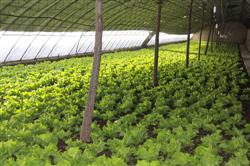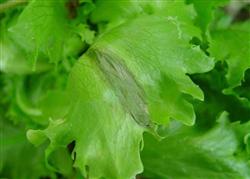Seedling raising of lettuce cultivated in greenhouse in winter

Selection of ① varieties: varieties with strong cold tolerance, disease resistance and adaptability, such as Emperor, Salinas, Dahu 659, etc., and fertile sandy loam with strong ability of water and fertilizer conservation should be selected in seedling bed. ② seedling bed preparation: because the lettuce seeds are small, the seedling bed farming requirements are strict, the soil preparation should be fine, and the bed soil should be fine and flat. 10 kg of fully ripened and finely crushed farm manure, 0.3 kg of diammonium phosphate and 0.3 kg of potassium dihydrogen phosphate were applied every 10 square meters of seedling bed. Spread the ground evenly, ploughing 10cm to 12cm, ploughing and leveling. ③ seed treatment: lettuce can be sowed with dry seeds or soaked to accelerate germination. When sowing dry seeds, sow seeds with 75% chlorothalonil wettable powder equivalent to 0.3% of the seed dry weight before sowing, and sow seeds immediately after mixing, not overnight. When soaking seeds to promote germination, first soak the seeds in 20 ℃ of water for 3 to 4 hours, after scrubbing, drain the water, put it into a wet yarn cloth bag or basin, put it in the environment of 20 ℃, rinse with clean water once a day, drain and continue to germinate, and the buds can be evenly budded in 2 to 3 days. When the temperature is too high under natural conditions, budding can be placed in the wellbore or in caves, and the temperature should be controlled at 15-20 ℃. ④ sowing: before sowing, the seedling bed is watered with enough water, while the water is not finished, sift the soil to level the border surface, sift the fine soil 0.1cm and 0.2cm thick after infiltration, and then sow. The seed consumption is 375-450 grams per hectare. In order to cultivate strong seedlings and prevent seedlings from overgrowing and forming tall seedlings or weak seedlings, sowing should not be too dense, generally 1 gram per square meter of seedling bed is appropriate. In order to sow evenly, the seeds can be sowed twice with sand, and then sift the soil to cover 0.3cm and 0.5cm. In order to prevent water loss, straw, wheat straw or plastic film can be sprinkled on the border according to the ground temperature. In order to prevent ants and crickets from eating seeds, spray dimethoate and dichlorvos on the bed after sowing. ⑤ seedling stage management: generally keep the bed temperature 20: 25 ℃ after sowing, the border surface is moist, and the seedlings can be ready in 3-5 days. If the temperature is too high, it should be moderately shaded to create a cold and humid environment to facilitate the healthy growth of seedlings. When the seedlings are just unearthed, the mulch on the border should be removed in time to prevent the formation of tall seedlings with overextended Hypocotyl. After emergence, it was 18: 20 ℃ in daytime and 8: 10 ℃ at night. 7-10 days after emergence, when the seedlings have two leaves in one heart, the seedlings should be divided in time with a distance of 3-5 cm. After dividing the seedlings, it should be sprayed with 500-fold solution of potassium dihydrogen phosphate or irrigated with water. The seedling stage should also be sprayed with 75% chlorothalonil wettable powder or 600% 800 times of 70% methyl topiramate wettable powder twice to prevent and control seedling diseases. The seedlings can be planted when they are 25-35 days old and have 4-5 true leaves.
- Prev

Control of lettuce rot
The disease is mostly infected from the petiole or root of the rhizome, and it is initially water-stained yellowish brown soft rot with a foul smell. Sometimes soft rot begins at the edge of the outer leaf or at the top of the bulb, and in severe cases the root pith and bulb rot. Germs spread through watering or insects, invading from the wounds and cracks of the plant. The optimum temperature for disease occurrence is 2.
- Next

High-yield cultivation techniques of spring onion
High-yield cultivation techniques of spring onion
Related
- Where is it suitable to grow horseradish in China? it is expected to see the middle altitude horseradish in Alishan.
- How to prevent tomato virus disease reasonably? (Control methods included)
- Many people like to plant towel gourd on the balcony. What are the main points of this method and management?
- What crops can chili peppers be mixed with?
- Fertilization techniques and matters needing attention in Tomato
- What are the grafting techniques for peach seedlings in spring?
- Harm and control methods of root swelling disease of Chinese cabbage
- What are the pests of sweet potatoes? How to prevent and cure it?
- Symptoms, causes and Control methods of navel Rot in Tomato
- The cause of "Cucumber rotten bibcock" in Farmers' planting Cucumber and its Control Plan

